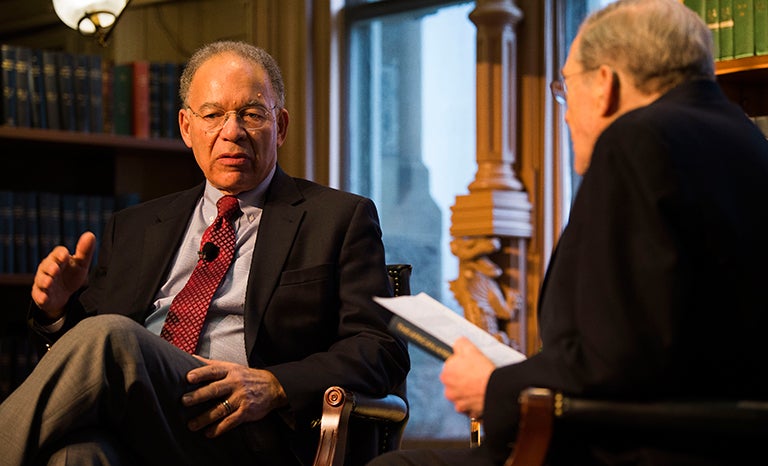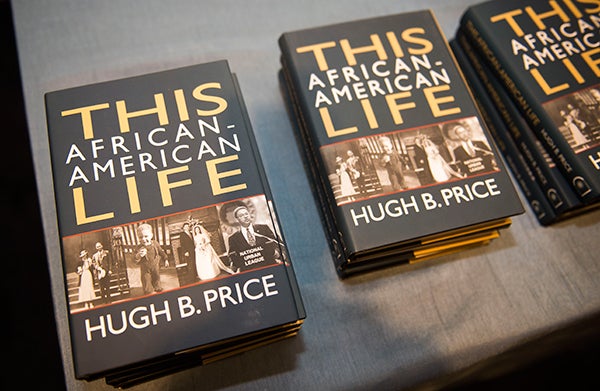Title: Civil Rights Leader Decries Continued Lack of ‘Robust Integration’ in America
Author and activist Hugh Price says American schools and communities still lack “robust integration,” during a Mellon Lecture Series conversation on racial justice and on his recent book, This African-American Life.

– Despite desegregation in the 1950s, American schools and communities still lack “robust integration,” author and activist Hugh Price said yesterday during a conversation on racial justice at Georgetown.
“While you can’t be barred from going to a school based on your race, we do find that residential and economic patterns perpetuate racial separation heavily along income lines,” Price said during the second talk in the university’s Mellon Lecture Series. “[We] wind up with kids who are demographically and ethnically landlocked. We don’t have robust integration that I think we would have had by now.”
The series, which continues throughout the spring semester, is made possible by a $1.5 million Andrew W. Mellon Foundation grant designed to help Georgetown carry out its commitment to produce scholarship to better understand and address the nation’s legacies of slavery, racism and discrimination.

This African-American Life
Price, a longtime civil rights leader, spent the early part of his career as a legal services lawyer. He later became vice presidentof the Rockefeller Foundation and served as president of the National Urban League from 1994 to 2003.
During his tenure in the latter position, Price spearheaded pressure on the federal government to combat police brutality and racial profiling, defended affirmative action and helped repair frayed relations between the African American and Jewish communities.
Peter Edelman, Carmack Waterhouse Professor of Law and Public Policy at Georgetown, moderated the conversation with Price, who talked also about his 2017 book, This African-American Life.
In the book, Price writes about his childhood in Washington, D.C., as well as his time as a student at Amherst College and Yale Law School.
Segregated D.C.
“I was blessed to grow up in the orbit of Howard University, and many of my parents’ best friends were faculty members and alumni of the school,” he told the audience.
But he also recalled the rigidness of segregated D.C., which then included the schools.
“The movie theaters were segregated. The department stores would allow you to buy clothes, but you couldn’t try them on.” he remembered. “We never went into Maryland or Virginia unless you knew someone there … because there were no services available to African Americans.”
Price grew up attendingthe Unitarian Church in Northwest D.C.
“That was a deeply integrated environment … and I went to [an integrated private school] for a year before the [public] schools were integrated in Washington,” he said. “It was a predominately segregated experience, and yet there were sort of these little windows into an integrated world.”
Changing Neighborhoods
Price entered Northeast D.C.’s Taft Junior High School in eighth grade as part of the first contingent of African American students at newly integrated schools.
“The amazing thing is how quickly the neighborhoods changed,” he recalled. “Our neighborhood in Northeast … went from overwhelmingly white to overwhelmingly black in the space of about three years. There were moving trucks pulling up every week as white families fled to [Prince George’s County, Maryland] and other suburbs.”
Unique Insights
While leading the Urban League, Price attempted to ensure quality education for African American children by launching the Campaign for African American Achievement.
The campaign was designed to spread the “gospel of achievement to our children, encourage our children to achieve,” encourage parents to become sophisticated consumers of their children’s education, and mobilize parents to hold their school systems accountable.
In addition to his work as a lawyer, advocate and leader, Price served on Georgetown’s board of directors from 2011 to 2014.
“Hugh offers an illuminating look at a professional life dedicated to racial justice, education and philanthropy,” Georgetown President John J. DeGioia said at the event, “and provides unique insights for equality social welfare and civil rights that have shaped our nation over the past half century.”